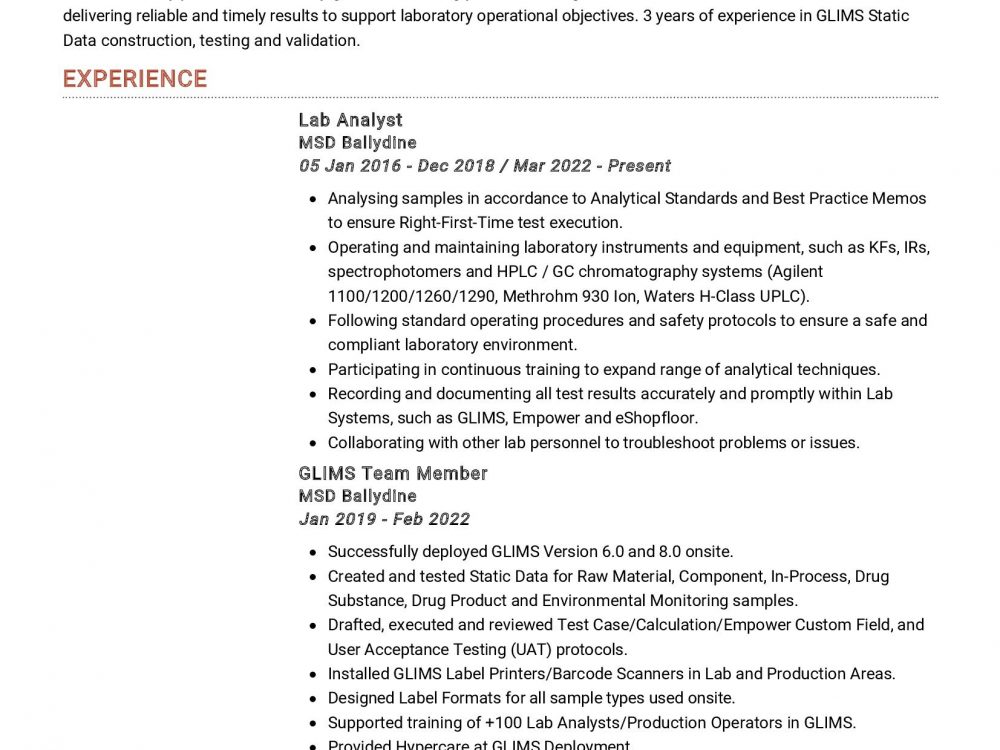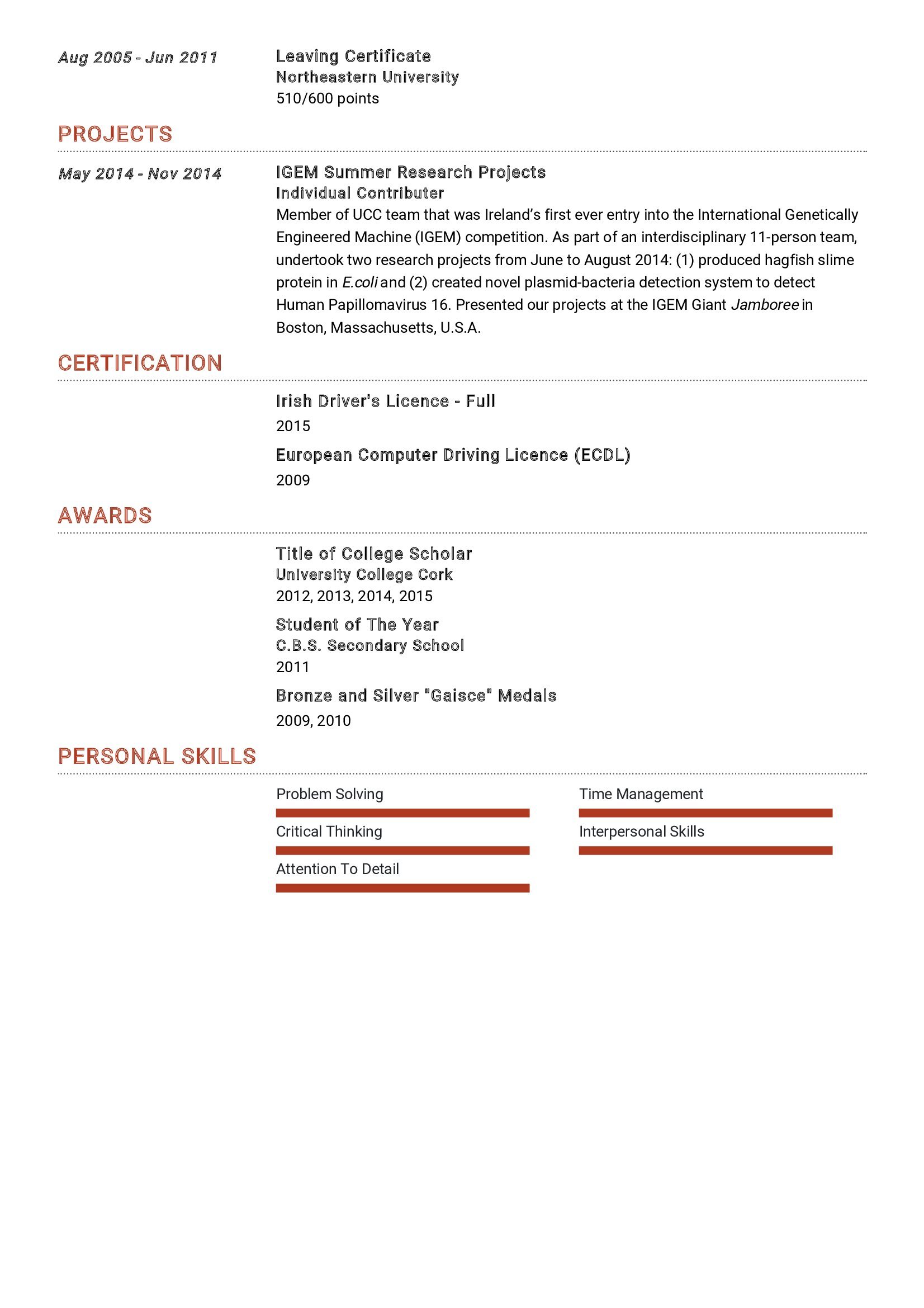Exploring the Role of a Lab Analyst
In the dynamic realm of scientific research and analysis, the position of a Lab Analyst holds a crucial role in ensuring accurate and reliable results. This article delves into the multifaceted responsibilities and requirements of a Lab Analyst, highlighting the skills and experiences that make for an exceptional candidate in this field.
Lab Analyst Job Requirements
Embarking on a career as a Lab Analyst involves meeting specific requirements that showcase a blend of educational background, technical expertise, and analytical skills. Let’s break down the prerequisites for this role:
- A Bachelor’s or Master’s degree in a relevant scientific field, providing a strong foundation in analytical techniques and methodologies.
- In-depth knowledge of laboratory procedures, including experience with various analytical instruments and equipment.
- Proven expertise in data analysis and interpretation, illustrating a track record of precise and reliable results.
- Attention to detail and organizational skills, honed through experiences in managing and documenting complex experiments.
- Effective communication skills to convey findings and collaborate with cross-functional teams.
- Adaptability and problem-solving abilities, crucial in addressing challenges that may arise during experiments or analyses.
Obtaining additional certifications in relevant analytical techniques or laboratory safety can further enhance your profile in the competitive job market.
Responsibilities of a Lab Analyst
The role of a Lab Analyst is diverse, requiring a combination of technical proficiency and methodological rigor. Let’s unravel the core responsibilities that define this position:
- Conducting various laboratory tests and experiments, ensuring adherence to established protocols and standards.
- Analyzing and interpreting data, drawing meaningful conclusions, and presenting findings to relevant stakeholders.
- Maintaining and calibrating laboratory equipment to ensure accuracy and reliability in results.
- Collaborating with research teams to design experiments and develop new testing methodologies.
- Ensuring compliance with safety regulations and maintaining a clean and organized work environment.
- Documenting procedures, results, and observations meticulously for future reference and analysis.
- Staying abreast of advancements in analytical techniques and technologies to continuously improve processes.
Each responsibility comes with its own set of challenges and learning opportunities, contributing to the professional growth of a Lab Analyst.
Lab Analyst Resume Writing Tips
Crafting a resume for the position of Lab Analyst involves showcasing not only your educational and technical qualifications but also your hands-on experience and achievements. Here are some tips to help you create an impactful resume:
- Highlight specific experiments or projects you have led, emphasizing the impact on research outcomes.
- Detail your proficiency with specific laboratory techniques, instruments, and software relevant to the role.
- Quantify your achievements where possible, using metrics to showcase the accuracy and reliability of your results.
- Include any publications, presentations, or conferences where you have shared your research findings.
- Personalize your resume for each application, aligning your skills and experiences with the job description.
Each tip is a step towards creating a resume that not only meets the job requirements but also stands out in a competitive job market.
Lab Analyst Resume Summary Examples
Your resume summary serves as the gateway to your professional journey, providing a snapshot of your skills and experiences. Here are some examples to inspire your Lab Analyst resume summary:
- “Dedicated Lab Analyst with a Master’s degree in Chemistry, offering extensive experience in designing and conducting experiments, resulting in groundbreaking findings.”
- “Detail-oriented Lab Analyst with a proven track record of accurate data analysis and interpretation, contributing to the success of multiple research projects.”
- “Analytically skilled Lab Analyst with expertise in a range of laboratory techniques, adept at collaborating with cross-functional teams to achieve research objectives.”
Each summary is an opportunity to showcase your unique strengths and contributions as a Lab Analyst.
Creating a Comprehensive Experience Section
Your experience section is the core of your resume, providing a detailed narrative of your professional journey. Here are some examples to guide you in crafting a strong experience section:
- “Led a team of researchers in a pharmaceutical laboratory, overseeing experiments that led to the development of a new drug compound.”
- “Implemented improved laboratory procedures, resulting in a 15% increase in efficiency and a reduction in experimental errors.”
- “Collaborated with external partners on a research project, presenting findings at an international conference and contributing to the organization’s reputation in the scientific community.”
Each experience is a chapter in your career story, showcasing your impact and contributions as a Lab Analyst.
Educational Background for Your Lab Analyst Resume
Your educational journey serves as the foundation of your expertise as a Lab Analyst. Here’s how you can present your educational qualifications:
- Master of Science in Chemistry, XYZ University, a comprehensive program focusing on advanced analytical techniques, 2017.
- Bachelor of Science in Biology, ABC University, providing a solid foundation in biological sciences and laboratory methodologies, 2014.
- Certification in Laboratory Safety, ensuring a commitment to maintaining a secure work environment, 2018.
Each educational qualification is a stepping stone, contributing to your knowledge and proficiency as a Lab Analyst.
Lab Analyst Skills for Your Resume
Your skill set is your toolkit, encompassing a range of abilities essential for success in the role of a Lab Analyst. Let’s list down the key skills that make a Lab Analyst excel:
Soft Skills:
- Attention to detail, ensuring precision in experimental procedures and data analysis.
- Effective communication, facilitating collaboration with research teams and the presentation of findings.
- Problem-solving abilities, crucial in addressing challenges and optimizing experimental processes.
- Time management, balancing multiple experiments and projects efficiently.
- Adaptability, essential in navigating evolving research objectives and methodologies.
Hard Skills:
- Proficiency in laboratory techniques, including but not limited to chromatography, spectroscopy, and microscopy.
- Data analysis using software tools like Excel, SPSS, or specialized laboratory software.
- Knowledge of safety protocols and regulations in a laboratory setting.
- Experimental design and execution, demonstrating a systematic approach to research.
- Documentation and record-keeping, ensuring the traceability and reproducibility of experiments.
Each skill is a valuable asset, contributing to the success of a Lab Analyst in delivering accurate and impactful results.
Common Mistakes to Avoid When Writing a Lab Analyst Resume
Avoiding common pitfalls in resume writing is essential to create a document that effectively represents your qualifications. Here are some mistakes to steer clear of:
- Using generic language, a pitfall that fails to distinguish your unique qualifications from other candidates.
- Neglecting to showcase specific achievements, resulting in a resume that lacks depth and impact.
- Underestimating the importance of a well-crafted cover letter, a missed opportunity to convey your passion for scientific research.
- Overloading your resume with technical jargon, potentially alienating non-technical hiring managers.
- Failing to proofread, a mistake that can detract from the professionalism of your application.
Avoiding these mistakes ensures your Lab Analyst resume is compelling, authentic, and stands out in the hiring process.
Key Takeaways for Your Lab Analyst Resume
As we conclude this comprehensive guide, let’s recap the key points to keep in mind while crafting your Lab Analyst resume:
- Highlight your specific contributions to research projects, showcasing the impact of your analytical skills.
- Detail your proficiency with laboratory techniques and equipment, aligning with the requirements of the role.
- Quantify your achievements where possible, using metrics to demonstrate the precision and reliability of your results.
- Include a section on continuous learning, showcasing any certifications or courses undertaken to stay updated in your field.
Finally, feel free to utilize resources like AI Resume Builder, Resume Design, Resume Samples, Resume Examples, Resume Skills, Resume Help, Resume Synonyms, and Job Responsibilities to create a standout application and prepare for the Lab Analyst job interview questions.
Armed with these insights and tips, you are now ready to craft a resume that effectively communicates your skills, experiences, and passion for scientific analysis. Best of luck!



